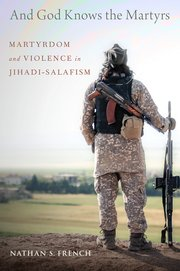Headed to @AARWeb's National Meeting virtually? Teaching on Jihadi-Salafism? I submit for consideration "And God Knows the Martyrs," published earlier this year with @OUPReligion. It's on discount if you use http://www.oup.com/conf/exaar20 #sblaar20
AGKM explores how Jihadi-Salafi authors attempted to craft legal arguments (i.e. fatwas) to legitimate "martyrdom operations." What happens when interdisciplinary approaches to Islamic studies and Islamic law are applied to Jihadi-Salafism? This is one attempt ....
Significant themes include Jihadi-Salafi discussions of martyrdom, Jihadi discussions of theodicy & asceticism (zuhd), of their creation of a legal methodology (however uneven), and of their usage of utilitarian ideas (e.g. a usage of maslaha for such purposes) ...
Then, we pivot and examine how ISIS -- through violence and brutality -- gendered martyrdom in its rulings by its actions, attempting, ultimately, to construct its state upon narratives of martyrdom and sacrifice. (Note: It's more than the magazines.)
Finally -- the book offers annotated translations and commentary of fatwas by Abu Muhammad al-Maqdisi, Hamud bin Uqla al-Shu'aybi, and Turki al-Bin'ali. These offer readers the chance to explore the evolution of Jihadi-Salafi legitimations of martyrdom operations over time.
A book like this doesn't just *appear.* I am forever indebted to the work of scholars and archivists like @MosulEye and @ajaltamimi. Their work is a testament to the profound human suffering inflicted by such fighters, & a testament to the using scholarship to preserve hope.
This book began as a series of papers I gave at the national meeting of @AARWeb as part of #sblaar20 #AARSBL2020 #IslamAAR. Thanks to the thoughts of Rumee Ahmed. Later, @mjerryson and @MargoKitts heard, edited, & published an unused chapter in the Journal of Religion & Violence
Along the way, the idea for this book was shaped by the faculty @CentreC, @WUSTLArtSCI -- and, as a dissertation project helped along by @UCSBReligion, @cmesucsb (special thanks to Ahmad Atif Ahmad, Juan Campo, Thomas Carlson, Racha El Omari, & Dwight Reynolds)
On Twitter, there are so, so many scholars whose work helped move my own ideas along. @Hegghammer, @JoasWagemakers, @kecia_ali, @will_mccants, and @flaggmiller were close to hand on my shelf.
@azelin's Jihadology project remains an *essential* part of my work and without it, it's unlikely the book would have appeared.
My bookmarks in my citation software catalogue numerous entries from the reporting and writing of @hxhassan, @JobyWarrick, @SteveCollNY, @gregorydjohnsen, @gcaw, @shadihamid, @lawrence_wright, @rcallimachi
As I wrote, I realized that though this was a text emerging from interdisciplinary approaches to religious and Islamic Studies, I relied on the research of @Akil_N_Awan, @intelwire, @MiaMBloom, @l_byman, @allthingsct, @brianfishman, @hoffman_bruce, @Drjohnhorgan, @charliewinter,
... @lizzypearson, @emswinterbotham, and @devorahmargolin (w/ thanks also to @gwupoe), @brianfishman ... And from Middle East, Central Asia, Islamic Studies, I read and re-read the work of Asma Afsarudddin, @ZareenaGrewal, @annestenersen, @garybunt, @jhoover04 (esp. on theodicy!)
And, then there were those whose ideas helped frame my thinking -- esp. grateful to @sahelblog's framing Salafism, @mloadenthal's discussion of sources, @CarlDahlman's discussions on politics and geography, and @AnnMWainscott's discussions of Islamism.

 Read on Twitter
Read on Twitter



